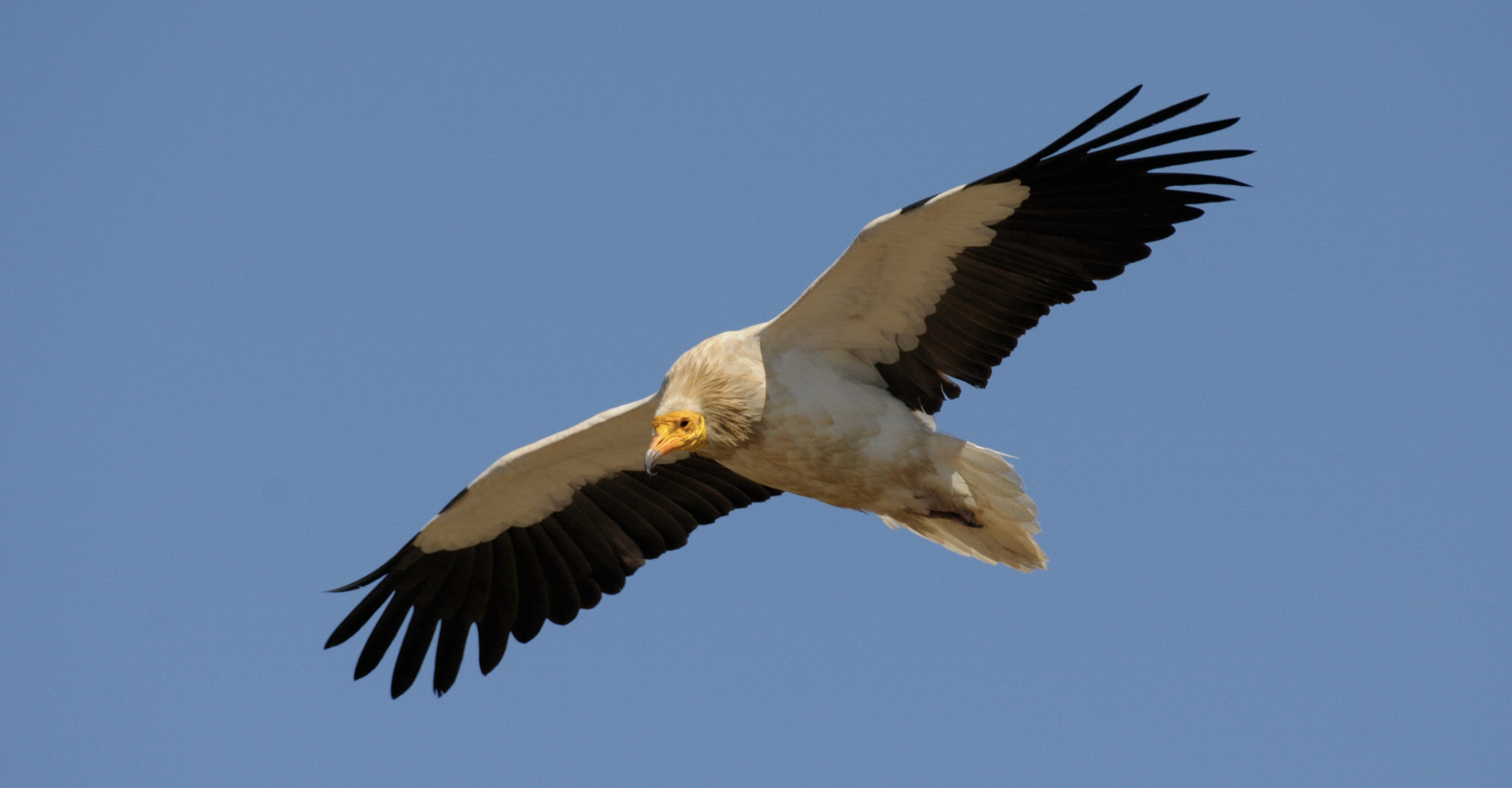
The Hellenic Ornithology Society/Birdlife Greece and the WWF Greece carried out their annual survey of the breeding population of Egyptian vultures in Greece and discovered a great result. Even though the number of occupied territories (six in total), number of pairs (five in total) and breeding pairs (four in total) remained the same as 2017 the number of successful fledings increased from three to five. Good news for this globally endangered vulture.
Egyptian vultures in Greece

The Greek population of Egyptian vultures is the smallest of all the populations in the Balkan Peninsula. In total it’s estimated that between 60 and 80 pairs of Europe’s smallest vulture across the Balkans.Over the last three decades there has been a four to nine percent annual decline in the population. In Greece that population consists of just five pairs. Elsewhere, Bulgaria hold around 40 percent of the region’s population with 28-30 pairs, in FYR of Macedonia there are 21-23 pairs, in Albania around 9-10 pairs and the European region of Turkey has around 2-3 pairs.
Population survey
In Greece there are two main regions where the Egyptian vultures are breeding according to the latest Hellenic Ornithology Society/Birdlife Greece and the WWF Greece survey for 2018:
The region of Thrace was home to four Egyptian vulture pairs (three in Dadia Forest National Park and one in Kompsatos area). The three pairs in Dadia nested, but only two managed to successfully raise their offspring, each of them raising two fledglings. All the fledglings flew successfully from their nests and departed for their (first) migratory journey. Although the pair in Kompsatos didn’t nest, an important discovery was made: one of the birds had been replaced by an Egyptian vulture from Bulgaria, but not only that, this bird was the only survivor of the nine chicks that had been tagged with a satellite transmitter in 2012! Although the pair spent the whole spring period in their territory, from July onwards they started also to visit very often the neighboring Bulgaria.
Young Egyptian vultures from the 2018 breeding season from Meteora and Thrace (c) D.Vavylis HOS/BirdLife Greece
The region of Meteora is home to just one breeding pair of Egyptian vultures but hailed two firsts in the 2018 breeding season. The first came on March 19th with the first observation of a returning Egyptian vulture in Greece and the whole Balkans, that of the well-known “Crooked-tail”, the lonely Egyptian vulture male of Meteora, who once again was left without a mate. The second one, came on May 22nd, when the first Egyptian vulture chick of the Balkans hatched in Meteora. But the greatest success of all was the fact that the last pair of Meteora managed to successfully raise their chick after four years of failed attempts! Towards the end of August, all four Egyptian vultures left the rocks of Meteora and started their migration trip to Africa.
In Epirus, Aoos, the adult Egyptian vulture, tagged with a satellite transmitter in 2015 by HOS/Birdlife Greece, returned again this year from the distant Chad where it usually winters. Unfortunately Aoos didn’t manage to raise a chick this year as he had in the previous years (his breeding territory is in Albania but visits the Konitsa region on a daily basis to feed) and thus began his long trip to Africa in mid-August, safely reaching his winter destination in sub-Saharan Africa.
Poisoning in Greece
One of the greatest achievements in 2018 was that no Egyptian vultures were poisoned, however, two discovery by the Hellenic Ornithology Society back in October that demonstrates that poisoning is still a threat to the Egyptian vultures of Greece.
The anti-poison dog unit were called to two incidents in October, the first in the Meteora region. 17 paraffin baits containing cyanide were found in Meteora. The baits were “strategically” placed at intersections and car parks, next to the road. During the field investigation a dog and a fox were also found dead.
Meanwhile, a dead wolf was reported to the team and during their investigation discovered it showed obvious signs of poisoning and was discovered next to the remains of a dead cow. Whilst investigating the site the team also noticed other animals interacting with the poisoned bait, cows, illustrating how easily poison can also affect humans.
The fieldwork was carried out by the HOS team in cooperation with the Forestry Services of Kalampaka, the Management Authority of the National Park of Tzoumerka, Acheloos valley, Agrafa and Meteora and the 5th Hunting Federation of Epirus.
It was the combination of luck and of constant efforts by projects like the Egyptian Vulture New LIFE against the illegal practice of poison baits that no Egyptian vultures were poisoned but this illustrates the threat to this small population is real.
Balkan Anti-Poisoning Project

The illegal use of poison continues to be the single most important threat to vultures in many of the Balkan countries, and is a current limiting factor for their recovery in the region.
Funded by the Mava Foundation we are leading on the Balkan Anti-Poisoning Project which is working across the region to engage relevant national governmental authorities in Greece and across the Balkans to fight against illegal wildlife poisoning and increase their capacity to counteract it and working together to take positive steps to protect vultures.
Egyptian Vulture New LIFE
The programme aims to reinforce the Egyptian vulture population in Europe’s easternmost range by delivering conservation measures that eliminate major known threats such as illegal poisoning and electrocution in their summer breeding grounds. In the whole of the Balkans there is just 60-80 pairs left in the whole of the region. The Egyptian Vulture New LIFE is a partnership of organisations, led by the Bulgarian Society for the Protection of Birds and Bulgarian conservation organisation Green Balkans,from 14 countries spanning Europe, the Middle East and Africa, to protect and conserve Egyptian vulture not only in Europe but all along their migratory flyway.







